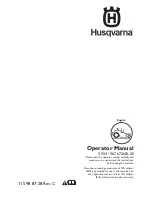
deck plow leaves or other debris that can cause
a buildup to occur. Clean oil or fuel spillage
before operating or storing the machine.
•
Let machine cool before storage.
WARNING!
When using the machine,
approved personal protective equipment must
be used. Personal protective equipment cannot
remove the risk of injury but it will reduce the
degree of injury if an accident does occur.
Speak to your retailer for aid in choosing the
right equipment.
Personal Safety Equipment
•
Make sure that first
aid equipment is
near at hand when
using the machine.
•
Do not use the
machine when
barefoot.
•
Always wear
protective shoes or boots. Steel toe caps are
recommended.
•
Always wear approved protective glasses or a
full visor when assembling or driving.
•
Always wear gloves when handling the blades.
•
Do not wear loose clothing that can become
caught in moving parts.
•
Use ear protectors to avoid damage to hearing.
Slope Operation
Slopes are a major cause related to loss of
control and tip-over accidents, which can result
in severe injury or death. Operation on slopes
requires more care. If you cannot back up the
slope or if you feel uneasy on it, do not mow it.
•
Mow across slopes (10 degrees maximum), not
up and down.
•
Look for holes, ruts, bumps, rocks, or other
hidden objects. Uneven terrain could overturn
the machine. Tall grass can hide obstacles.
•
Select a low ground speed so it will not be
necessary to stop while on the slope.
•
Do not mow on wet grass. Tires can lose
traction.
•
Avoid starting, stopping, or turning on a slope. If
the tires lose traction, disengage the blades and
continue slowly straight down the slope.
•
Move slowly and gradually on slopes. Do not
make sudden changes in speed or direction,
which could cause machine to tip over.
• Use more care while operating machine with
grass catchers or other attachments; the
stability of the machine can be effected.
•
Do not use on steep slopes.
•
Do not mow near drop-offs, ditches, or
embankments. The machine could suddenly
roll over if a wheel is over the edge or the edge
caves in.
WARNING!
Do not drive across hills with
slopes greater than 10 degrees. Do not drive
up or down slopes.
Safe Handling of Gasoline
To avoid personal injury or damage to property,
use care in handling gasoline. Gasoline is very
flammable and the vapors are explosive.
WARNING!
The engine and the exhaust
system become very hot during operation.
There is a risk for burns if touched. Let engine
and exhaust system to cool before refueling.
•
Do not fuel the machine indoors.
•
Extinguish all cigarettes, cigars, pipes, and
other sources of ignition.
•
Use only approved gasoline containers.
•
Do not remove gas cap or add fuel with
the engine running. Let engine cool before
refueling.
•
Do not keep the machine or fuel container
where there is an open flame, spark or pilot light
such as on a water heater or other appliance.
•
Before you start refueling, keep the risk of static
electricity to a minimum by touching a metal
surface.
•
Do not fill containers in a vehicle or on a truck
or trailer bed with plastic liner. Always put
containers on the ground away from the vehicle
when filling.
•
Do not put too much fuel in the tank. Replace
gas cap and tighten securely.
•
Remove gas-powered equipment from the truck
or trailer and refuel it on the ground. If this is not
possible, refuel such equipment with a portable
container, rather than from a gasoline dispenser
nozzle.
• Keep the nozzle in contact with the rim of the
fuel tank or container opening at all times until
fueling is complete. Do not use a nozzle lock-
open device.
•
If fuel is spilled on clothing, change clothing
immediately.
8
SAFETY
Содержание V554
Страница 41: ...41 SERVICE JOURNAL ...
Страница 42: ......
Страница 43: ......
Страница 44: ...2018 05 01 ...









































